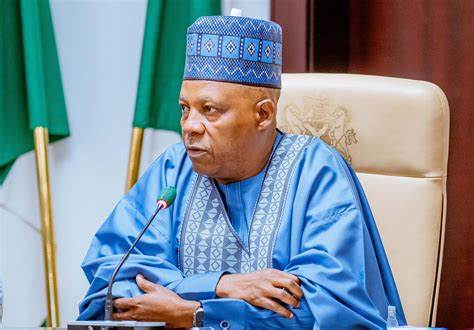Subtle political maneuvering within Nigeria’s ruling All Progressives Congress (APC) has intensified as party stakeholders quietly debate Vice President Kashim Shettima’s prospects for the 2027 presidential ticket.
Behind closed doors, influential party figures are engaging in what sources describe as strategic positioning ahead of the next election cycle, with northern governors reportedly exploring opportunities to secure the vice presidential slot alongside President Bola Tinubu’s expected re-election bid.
Sources within the party hierarchy have confirmed active lobbying efforts targeting Shettima’s position, though official party organs remain publicly silent on the matter. A senior APC official, speaking confidentially, revealed the existence of coordinated attempts to influence presidential decision-making. “The move to replace Shettima with another running mate for President Tinubu in the 2027 election is real. Some party leaders are working tirelessly to persuade the President to drop the Vice President and choose either a governor from the North-East or another from the North-West,” the source disclosed.
The political maneuvering has been characterized as a “cold war” – sophisticated and calculated rather than confrontational, reflecting the delicate nature of high-stakes political positioning within Nigeria’s ruling party. One party insider described the unfolding dynamics as high-level political strategizing rather than an outright crisis, noting that various National Executive Committee and National Working Committee members are discreetly supporting different options.
Despite acknowledgment of internal discussions, party leadership has moved to minimize public perception of conflict. Deputy National Organising Secretary Nze Duru dismissed suggestions of organizational turmoil, emphasizing the party’s stability and focus. “APC is calm and cool. The party is focused on two things: governance and delivering dividends of democracy to Nigerians,” Duru stated, reinforcing the party’s commitment to its governing mandate.
He defended the democratic process of candidate selection, noting that President Tinubu retains ultimate authority over running mate decisions. “Our candidates have the first right of refusal. It was the President who selected Shettima in 2023 based on deliberate and informed considerations. That choice contributed to our victory. That’s how democracy works,” Duru explained.
Party insiders have offered varying perspectives on the significance of the ongoing discussions. While some officials describe the situation as routine political strategizing inherent in democratic systems, others acknowledge the serious nature of the positioning efforts. “Some party leaders are insisting that Shettima should remain Tinubu’s running mate in 2027, while others are pushing for alternatives. That’s politics. But ultimately, only the President can make that call,” one party chieftain observed.
The developments highlight the complex dynamics within Nigeria’s ruling party as it begins informal preparations for the 2027 electoral cycle, balancing regional interests, political loyalty, and strategic considerations in anticipation of the crucial decision-making period ahead.



















